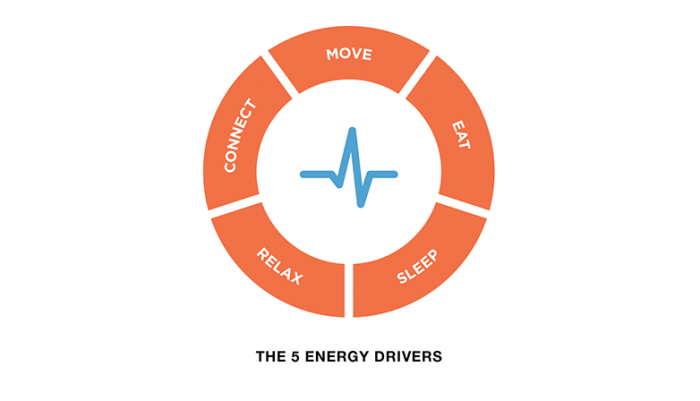Practice 6: Manage Your Time and Energy

Make time for priorities.
As individuals progress on their leadership track, the must decide how they’re going to work, balance their life, and renew themselves. By establishing effective patterns now, it will serve them in the long term. Effective leaders resist the natural temptation to neglect their health, professional development, or personal life. Great leaders identify their needs, make time for their priorities, and model this behavior for their team.
To effectively manage their time and energy, leaders need to shift their mindset from ‘I am too busy to take time for myself’ to ‘I must manage my time and energy to be an effective leader.’
The 5 Energy Drivers
There are 5 drivers to generating energy: moving, eating, sleeping, relaxing, and connecting. When leaders make regular investments into those 5 drivers, they create a pattern that is self-sustaining. Below are the 5 drivers, along with some practical tips to leverage the driver to generate energy.

The 5 Energy Drivers Expanded
Sleep
- Understand how vital sleep is to your overall health, specifically your brain health.
- Create space between your active, full-on day and your bedtime. Find a routine that works for you.
- Relaxing activities and routines, such as evening yoga and meditation, can also aid sleep.
Relax
- Don’t confuse relaxation with numbness.
- Take mental mini-breaks throughout the day.
- Be proactive about scheduling a longer mental break.
Connect
- Volunteer by giving back to your community or to those in need.
- Invest in your social network or reach out to someone in need.
- Create special moments to celebrate with friends, family, or peers.
Move
- Treat exercise as a luxury—it is something you get to do as opposed to have to do.
- Think outside the gym exercise doesn’t always require equipment.
- Find your people, like a training partner or accountability buddy to increase the likelihood you will exercise.
Eat
- Remember the main purpose of eating is to fuel yourself with energy, not just to satisfy hunger.
- Inventory your food choices last week. Tracking choices will help you make better ones.
- Prepare for your post work hunger. When you have healthy snacks ready, they are easier to choose.

How do I become a highly effective manager? To answer that question, let’s climb out of the crevices of the ‘day-to-day’ so we can see things from a mountaintop perspective—to challenge the mindset that is bringing us the results of today so we may get superb results tomorrow.
Free Guide
Crucial Insights For First-Level Leaders
Leading a team requires a different skillset than working as an individual contributor.
Register for an Event
Everyone Deserves a Great Manager Webcast
Discover the proven best practices to develop your people into a high-performing team.
The 6 Critical Practices for Leading a Team™
Leading a team requires a different mindset than working as an individual contributor. Explore the critical mindset shifts that will maximize success as a leader of others.
Increase engagement of team members by conducting regular 1-on-1s, deepen your understanding of team member issues, and help them solve problems for themselves.
Create clarity about team goals and results; delegate responsibility to team members while providing the right level of support.
Give feedback to develop team member confidence and competence; improve your own performance by seeking feedback from others.
Identify specific actions to help team members navigate and accelerate through change and achieve better performance.
Use weekly planning to focus on the most important priorities, and strengthen your ability to be an effective leader by applying the 5 Energy Drivers.





